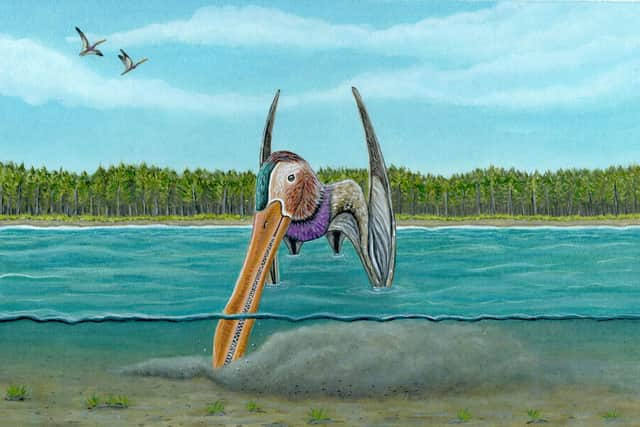University of Portsmouth Professor makes fascinating discovery


The pterosaurs - which were winged cousins of dinosaurs - evolved sensitive beaks to allow them to find food in the same way modern birds such as ducks, sandpipers and kiwis do today.
The discovery was made by professor David Martill whose research revealed dozens of tiny holes in the tip of the beak, where the nerves passed through the bone. Clusters of nerves are seen in the beaks of birds which rely heavily on their sense of touch when finding and catching food.
Advertisement
Hide AdAdvertisement
Hide AdTypically, they either probe in water and mud for food or feed on plants, using electrical signals to sense prey.


Professor Martill said: ‘This new find hints that, like birds, the pterosaurs evolved a huge range of feeding strategies - including ways of finding their prey.
‘Many pterosaurs would have used their sharp eyes to pick out prey on the wing, while stalking it on the ground. But this species apparently used the sensitive beak to find prey by touch - feeding on the ground and probing around in shallow water like a dabbling duck or spoonbill, perhaps even feeding at night.
‘These animals could probably detect a fish in the muddiest of water.’
Advertisement
Hide AdAdvertisement
Hide AdPterosaurs lived in the age of dinosaurs and hand wingspans of up to 10 metres.
Professor Martill made the new discovery after studying the fossilised remains of a pterosaurs found in a chalk pit in Kent.
A message from the Editor, Mark Waldron
Thank you for reading this story. The dramatic events of 2020 are having a major impact on our advertisers and thus our revenues.
The News is more reliant than ever on you taking out a digital subscription to support our journalism. You can subscribe here for unlimited access to Portsmouth news and information online.
Every subscription helps us continue providing trusted, local journalism and campaign on your behalf for our city.
Comment Guidelines
National World encourages reader discussion on our stories. User feedback, insights and back-and-forth exchanges add a rich layer of context to reporting. Please review our Community Guidelines before commenting.